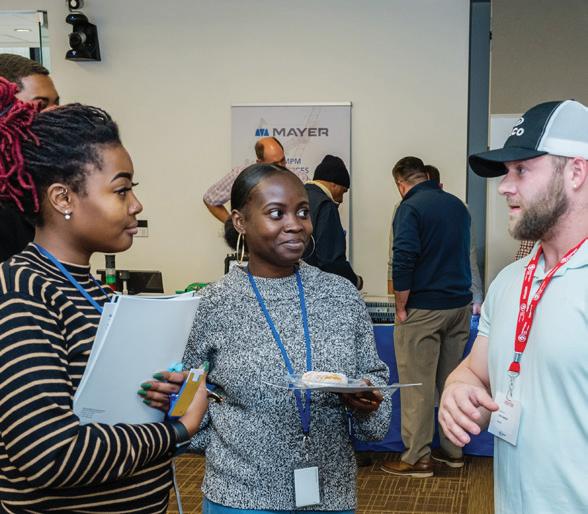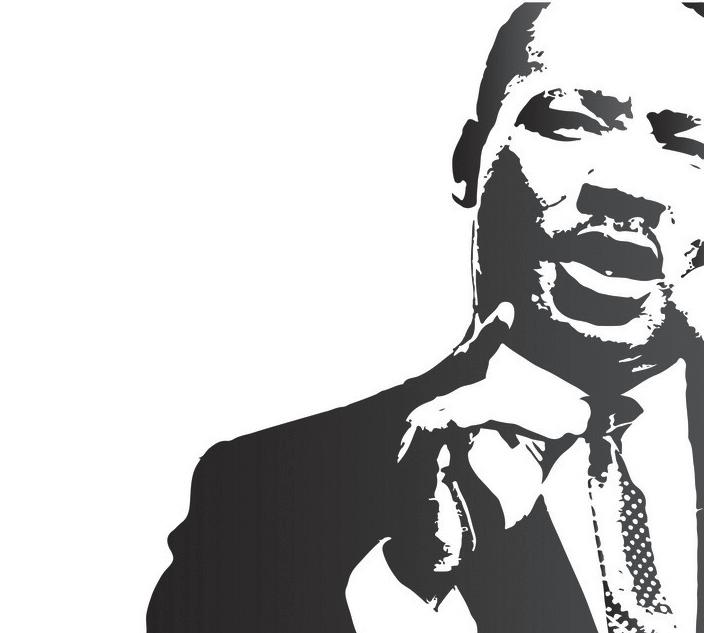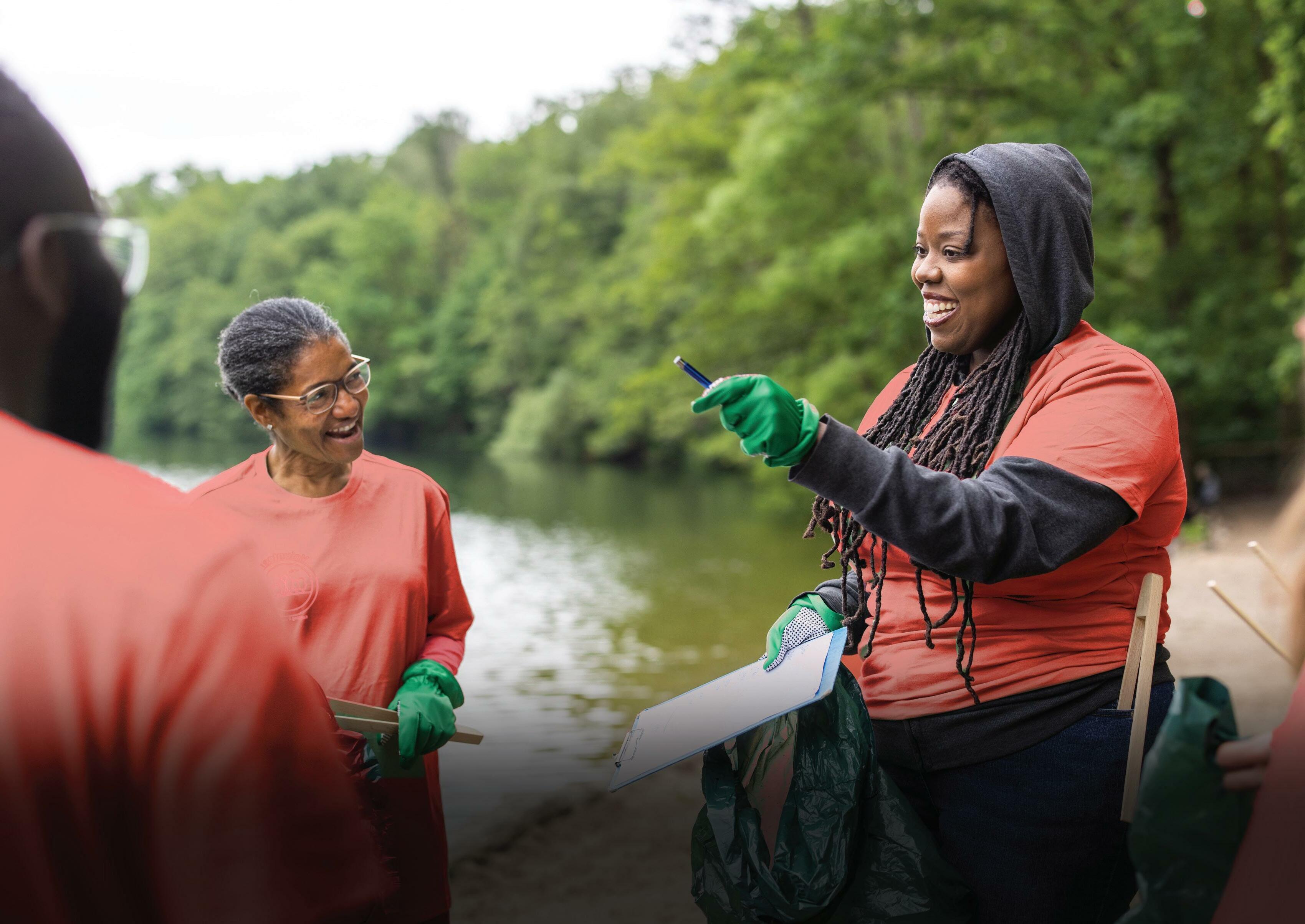

THE WASHINGTON INFORMER NEWSPAPER (ISSN#0741-9414) is published weekly on each Thursday. Periodicals postage paid at Washington, D.C. and additional mailing offices. News and advertising deadline is Monday prior to publication. Announcements must be received two weeks prior to event. Copyright 2016 by The Washington Informer. All rights reserved. POSTMASTER: Send change of addresses to The Washington Informer, 3117 Martin Luther King, Jr. Ave., S.E. Washington, D.C. 20032. No part of this publication may be reproduced without written permission from the publisher. The Informer Newspaper cannot guarantee the return of photographs. Subscription rates are $55 per year, two years $70. Papers will be received not more than a week after publication. Make checks payable to:


THE WASHINGTON INFORMER
3117 Martin Luther King, Jr. Ave., S.E Washington, D.C. 20032 Phone: 202 561-4100
Fax: 202 574-3785
news@washingtoninformer.com
www.washingtoninformer.com

Living the True Dream: the Power of Love in Action
By Micha Green WI Managing Editor

Welcome to Mimi’s Musings, a commentary column from WI Managing Editor Micha Green, that goes beyond her work as a journalist and editor, and dives into the storyteller’s thoughts and worldview.
In contrast to holidays encouraging Americans to relax, spend money or gather with family, the federal holiday in honor of the Rev. Dr. Martin Luther King Jr., also known as MLK Day, emphasizes service and action. While many people don’t have to go to work and school, justice advocates note that the King holiday is a day on, not off.
I was honored to have the opportunity to speak at Millbrook School, a private, co-ed boarding school in Stanford (or Millbrook) New York. My longtime friend and Millbrook’s Director of Diversity, Equity, Inclusion Prince Botchway asked me to moderate a panel with the theme the “Power of Love.”
Inspired by an excerpt from King’s “Where Do We Go From Here,” speech in August 1967, the panel focused on King’s notion that power and love work together.
In the beginning of his address, King says philosophers and theologians have given the concepts of power and love a bad rap. He references Nietzche’s will to power, which, in thought, requires the absence of the Christian ideals of love. He adds Christian theologians reject the notion of power in upholding religious values. King encourages the audience of primarily preachers to correct that narrative.
PUBLISHER

Denise Rolark Barnes
STAFF
Micha Green, Managing Editor
Ron Burke, Advertising/Marketing Director
Shevry Lassiter, Photo Editor
Lafayette Barnes, IV, Editor, WI Bridge DC
Jamila Bey, Digital Content Editor

Austin Cooper, Our House Editor
Desmond Barnes, Social Media Stategist ZebraDesigns.net, Design & Layout
Mable Neville, Bookkeeper
Angie Johnson, Office Mgr./Circulation
REPORTERS
Kayla Benjamin, (Environmental Justice Reporter) Stacy Brown (Senior Writer), Sam P.K. Collins, Curtis Knowles, Brenda Siler, Lindiwe Vilakazi, Sarafina Wright, James Wright
PHOTOGRAPHERS
Shevry Lassiter, Photo Editor, Roy Lewis, Jr., Robert R. Roberts, Anthony Tilghman, Abdula Konte, Ja'Mon Jackson
“Now, we got to get this thing right. What is needed is a realization that power without love is reckless and abusive, and that love without power is sentimental and anemic,” he said. “Power at its best is love implementing the demands of justice, and justice at its best is love correcting everything that stands against love.”
If love is King’s solution to achieving justice, then I contend that love in action was the civil rights activist’s true dream.
The famous, “I have a Dream Speech,” (1963) lists King’s visions for an equal society: much of which has been achieved without the full equity for which he hoped.
King dreams, “one day on the red hills of Georgia, the sons of former slaves and the sons of former slave owners will be able to sit down together at the table of brotherhood.” While Georgia boasts booming Black communities and a Black U.S. Senator Raphael Warnock (D), in 2021 Republican Governor Brian Kemp signed legislation that disproportionately hurt voters of color– an act many called a form of voter suppression.
Achieving equity requires more than being able to dine at the same table as white Americans, it’s about having a level playing field before being invited, maintaining a seat, and feeling comfortable to break bread at the proverbial table– even despite differences.
Love in action is being able to sit at the table and grapple with the differences in a way that promotes growth and inspires a renewed way of navigating challenges.
King’s ideals on love and power offer a guide to equity and overall justice.
In the panel at Millbrook, panelists Alpana Chhibber, Kojo Clarke, Dwight Vidale and Bria Horsely built on one another’s ideas of love in action, noting: listening, asking questions, humility, and being courageous to create space for change are all ways of furthering equity conversations.
It’s not always easy to listen, ask questions not loaded with judgment, or work with those with whom we disagree, but that’s when the power of love comes into play. Leading with love is the light guiding us through the dark tunnel of scary differences and ignorance.
Leading with love was King’s true hope for us, to not only achieve civil rights, but to continue to guide us through modern challenges, such as systemic racism, attacks on reproductive rights, environmental injustice and the fight for reparations.
WI
MLK-2 www.washingtoninformer.com / THE WASHINGTON INFORMER 2023 MARTIN LUTER KING JR SUPPLEMENT
In Memoriam Dr. Calvin W. Rolark, Sr. Wilhelmina J. Rolark
MIMI’S MUSINGS
5 WI Managing Editor Micha Green considers King’s notion on the power of love to guide us today. (Courtesy Photo)
Local and National Leaders Remember King, Continue Fighting
Hamil R. Harris
WI Contributing Writer
VIRGINIA ALI
The Rev. Dr. Martin Luther King Jr. had just met with President John F. Kennedy to discuss his plans to convene the 1963 March on Washington, and JFK was concerned.
“Dr. King and organizers of the March often came into Ben’s because their office was on 14th and U,” said Virginia Ali, who co-founded Ben’s Chili Bowl with her husband Ben Ali in August 1958. “That was a real privilege meeting with Kennedy, but he was concerned that a large protest would provoke injustice.”
Despite the President’s concerns, more than 250,000 people converged on the grounds between the Washington Monument and the Lincoln Memorial on August 28, 1963, and Ali, 89, said, “Ben and I were there.”
Had King lived, he would have been 94 on Jan. 15, and in observance of the occasion, Ben’s Chili Bowl served free meals to school teachers who visited the restaurant.
FRED GRAY
In the days leading up to the activist’s holiday, Fred Gray, the lawyer for King and Rosa Parks, said he spends his time these days continuing to keep King’s legacy alive.
“I am speaking in Lansing, Michigan, Sunday, and Monday, I will be at Emory University on Wednesday, and next week, I have to go down to Miami to speak to a group of lawyers,” said Gray, who, at 92, said.
“I’m delighted to talk about Dr. King for several reasons.”

“I was one of two persons who recommended Dr. King at the Montgomery bus boycott, and the other person was Joanne Robinson,” he said. “We made that recommendation after Mrs. Park’s arrest,” added Gray, who while in the Alabama state legislature between 1971-1972, recommended King’s become a holiday.
REV. JESSE JACKSON
Rev. Jesse Jackson, 82, had plenty to say about what his focus has been leading up to the 2023 King holiday and beyond.
“When we register to vote, we change the composition of America,” Jackson said.
REV. GRAINGER BROWNING
Rev. Grainger Browning, the pastor of Ebenezer A.M.E. in Fort Washington, said, “Dr. King would have been 94, and everything that we fought for 60 years ago we are fighting for today: jobs, police brutality, issues of race discrimination, but Dr. King would also be concerned with the role of technology and how it is dehumanizing personal relationships.
”It is no longer what’s important but what gets the most views,” Browning added. “What gets the most views can be the most outlandish, the craziest. It’s no longer world poverty, world hunger because these issues are no longer popular.”
THE KING CENTER HONORS MELANIE CAMPBELL
King was assassinated on April 4, 1968, and a few years later, the Martin Luther King Jr. Center for Nonviolent Social Change opened in

Atlanta adjacent to his tomb.
On Jan. 14, the Martin Luther King Jr. Center for Nonviolent Social Change presented “The Beloved Community Awards.” Onee of the awardees was Melanie Campbell, president and CEO of the National Coalition on Black Civic Participa-
tion (NCBCP).
“The King Center is where I cut my teeth, and to get this award is humbling,” said Campbell in an interview before she accepted her award during a program hosted by Malcolm Jamal Warner and Keisha Knight Pulliam. WI
H-3 THE WASHINGTON INFORMER 2023 MARTIN LUTER KING JR SUPPLEMENT / www.washingtoninformer.com MLK-3
WI
Exclusive: Jesse Jackson, Virginia Ali, Fred Gray
5 The Rev. Jesse L. Jackson speaking to Dr. King. Jackson said he continues to work to keep King’s legacy alive. (Courtesy Photo/ Facebook)
Dr. King’s Quest for Economic Justice Continues
By Charlene Crowell Senior Fellow
Center for Responsible Lending (CRL) Charlene.Crowell@responsiblelending.org
On January 16, the nation marked its 37th national holiday honoring the life of Rev. Dr. Martin Luther King, Jr. (1929-1968). Across the country observances chronicled how one man’s efforts pricked the moral conscience of the nation in a lifespan of only 39 years.
When he was just 26 and a new pastor at Montgomery’s Dexter Avenue Baptist Church, Dr, King was chosen by community leaders to lead



the effort to desegregate the city’s buses following the arrest of Rosa Parks, who refused to give up her seat to a white man.
From December 1955 and continuing for 13 months, an estimated 50,000 Black residents of Montgomery chose to walk, carpool, or patronize Black cab drivers. In the end, the boycott brought economic devastation and a U.S. Supreme Court ruling that the city’s segregation policies violated the Constitution’s 14th Amendment that guaranteed equal protection under the law.



The 2023 observance was also a time to recall how it took 32years to create the first national holiday to
honor a Black person. Although the federal holiday was enacted in 1983, its first observance came three years later in 1986, and at the time only 17 states observed its commemoration. It wasn’t until 2000 that all 50 states observed the King holiday.


Dr. King’s lifelong quest for economic justice is consistent throughout his sermons, speeches, and other writings.
On March 14, 1968, weeks before his assassination, Dr. King gave a speech entitled The Other America. In it, he describes how our nation actually reflected two vastly different experiences. In one, “millions of people have the milk of prosperity and the honey
of equality flowing before them… In this America children grow up in the sunlight of opportunity,” noted Dr. King.
“But there is another America,” continued Dr. King. “This other America has a daily ugliness about it that transforms the buoyancy of hope into the fatigue of despair…Probably the most critical problem in the other America is the economic problem. There are so many other people in the other America who can never make ends meet because their incomes are far too low if they have incomes, and their jobs are so devoid of quality.”
Today the unfortunate reality for much of Black America is that we continue to toil and suffer from that same economic “fatigue of despair”.
As a people, we fervently believe in the value of higher education; but meager financial resources force our students to incur six and sometimes seven figures of debt. Despite laws that call for equal credit, our access to affordable credit is often limited and instead Black Americans are plagued by predatory lending that leaves us with high-cost debts.
In the aftermath of the foreclosure crisis that disproportionately harmed Blacks and other people of color, Congress created the Consumer Financial Protection Bureau (CFPB) to be a financial cop-on-the-beat.
Since opening its doors in 2011, the CFPB has received more than 3.3 million consumer complaints, and delivered over $14.9 billion in monetary compensation, principal reductions, cancelled debts, and other consumer relief through its enforcement and supervisory work. Nearly three in four complaints filed – 73 percent – were about credit or consumer reporting. The remainder of the complaints reported issues with debt collection, credit cards and checking/savings accounts and mortgages.
Even so, the quest for financial justice continues. Laws and regulations must be vigorously enforced. But just as with civil rights legislation, the naysayers remain aggressive.
Over the past year, CFPB’s research and surveys have documented how consumers remain at risk via emerging consumer issues such as the Buy Now, Pay Later (BNPL) industry, elder financial exploitation, nursing home debt collection, college banking, student loans, and medical debt on credit reports and payments.
Testifying before the House Finan-
cial Services Committee (HFSC) on December 14, CFPB Director Rohit Chopra warned lawmakers of the growing dangers of BNPL.
“The CFPB’s recent study on Buy Now, Pay Later noted a significant increase in use of these products to fund essential goods and services,” said Chopra. “The CFPB is working to ensure that Buy Now, Pay Later lenders adhere to the same protocols and protections as other similar financial products to avoid regulatory arbitrage and to ensure a consistent level of consumer protection.”
Weeks earlier on November 2, the potential harms of BNPL were the topic on the HFSC’s Task Force Financial Technology. Marisabel Torres, speaking on behalf of the Center for Responsible Lending said, “When the borrower’s BNPL loan is linked to a bank account that lacks sufficient funds for payment, the BNPL lender’s payment attempts will typically trigger highly punitive non-sufficient funds (NSF) and/or overdraft fees…These fees in turn are highly associated with closed bank accounts and exclusion from the financial system. Or, the borrower may have sufficient funds for the BNPL payment but then be left without sufficient funds for other essential living expenses or debts. And many BNPL providers charge their own late or returned payment fees on top of the fees charged by banks.”
For these economic and equality issues, Dr. King’s own words continue to challenge America to live up to its creed:
“Expediency asks the question is it politics? Vanity asks the question is it popular? The conscience asks the question is it right? And there comes a time when one must take a position that is neither safe nor politics nor popular, but he must do it because conscience tells him it is right.”
Amen, Dr. King. WI
MLK-4 www.washingtoninformer.com / THE WASHINGTON INFORMER 2023 MARTIN LUTER KING JR SUPPLEMENT B L A C K R E S I S T A N C E T H E 2 0 2 3 B L A C K H I S T O R Y M O N T H A L L M O N T H L O N G D U R I N G F E B R U A R Y C E L E B R A T I N G T H E 9 7 T H A N N U A L B L A C K H I S T O R Y T H E M E : F E S T I V A L V I R T U A L W W W . A S A L H . O R G / F E S T I V A L | 2 0 2 . 2 3 8 . 5 9 1 0 | # A S A L H A S S O C I A T I O N F O R T H E S T U D Y O F A F R I C A N A M E R I C A N L I F E A N D H I S T O R Y MARQUEE ACCESS $ 6 5 $ 1 2 5 $ 1 5 0 SILVER ACCESS GOLD ACCESS GENERAL ADMISSION INCLUDES A CONVERSATION WITH SECRETARY LONNIE G BUNCH III PLUS ASALH membership and digital access to Amanda Gorman s book The Hill We Climb PLUS Silver benefits and hard-cover book The Hill We Climb T H E F O U N D E R S O F B L A C K H I S T O R Y M O N T H
5 MLK Jr Preaching (courtesy of Penn State University)
Remembering King Through Prayer UPO
Denise Rolark Barnes and Micha Green Publisher and WI Managing Editor
and MLK,Jr.
Holiday DC hold King-Centered Prayer Breakfasts
Justice,’ an often-overlooked part of Dr. King’s legacy. It is because of Johnson’s War on Poverty and Dr. King’s economic justice advocacy that community action agencies, like UPO, exist.
gave everything, including his life, to give something. Your job is to serve.”
As the nation geared up to celebrate the federal holiday honoring the Rev. Dr. Martin Luther King Jr., local organizations prayed, hosting events centered around King’s unapologetic emphasis of faith to fight the struggle.
UPO HOSTS 39TH ANNUAL BREAKFAST, FIRST SINCE PANDMEIC
The United Planning Organization (UPO) celebrated its 60th anniversary at its 39th annual MLK, Jr. Memorial Breakfast, Friday, Jan. 13, marking the first in-person event held in three years since the COVID-19 pandemic and with more than 600 supporters in attendance.

Jeffrey Page, the youngest board chair to serve in UPO’s history, reflected on the breakfast theme, ‘Economic
Founded in 1962 as part of the U.S. government’s War on Poverty, thousands of area residents have benefitted from the broad range of services UPO offers, including $1.4 million awarded in scholarships, education services, job placement, as well as expanded resources through the pandemic.
Del. Eleanor Holmes Norton (D-District of Columbia) introduced keynote speaker Rep. Emmanuel Cleaver (D- Missouri), whom she praised for helping to champion D.C. statehood.
Cleaver said he often thinks about, “What if Africans had not come to America,” and how different the U.S. would be. He stressed the contributions Blacks have made, including the Rev. Dr. Martin Luther King, Jr. “who helped change America.”
“Use the memory of Dr. King, who
Keiri Sanchez, a student at Bell Multicultural High School, who served as the event’s MC, was one of five students to receive a $10,000 Joseph Beaver Scholarship to help realize their dreams of becoming a pilot, engineer, biologist, therapist, and zoologist, respectively.
MLK HOLIDAY DC 5TH ANNUAL PRAYER BREAKFAST FOCUSES ON UNITY
Before preaching at the fifth annual MLK Holiday DC Prayer Breakfast on Jan. 14, the Rev. Dr. E. Gail Anderson Holness, pastor of Adams Inspirational A.M.E., told the Informer why it’s important to hold such gatherings.
“[We pray], because we know where we’ve been, but we don’t know where we’re going. We’ve come this far by faith, and people need to know that there is camaraderie, there is collectiveness, there is power in numbers, and
we are not by ourselves,” Holness said. “This breakfast shows: unity, togetherness, that we can fight whatever issues we have in our community together, because together we stand, divided we fall.”
With the District facing high homicide rates and fervent fights for: equity and statehood, the event’s speakers ensured audiences left with plans of action. Acknowledging the breakfast’s theme “Recapture the Dream: Lift Every Voice til Victory is Won,” speakers emphasized the importance of collective action to conquer justice goals.
Councilmember Trayon White (D-Ward 8) said collaboration is key in demanding change.
“I want to empower you today, in the spirit of Dr. King, to unite. Dr.
5 A leader in housing reform, Rep. Emmanueal Cleaver (D-Missouri), UPO Annual MLK King Breakfast keynote speaker, points to the two-room shack in Texas where he was raised without running water, indoor plumbing or electricity. (D.R. Barnes/ The Washington Informer)
King always said unity or non-existence,” White said.
The Rev. Thomas Bowen, director of the Mayor’s Office of Religious Affairs, preached that D.C. statehood is a “river to cross.”
Also the interim director of the Mayor’s Office on African American Affairs, Bowen referenced the famous rallying tune, “We Shall Overcome.”
“Deep in my heart, I do believe Washington, D.C. will be a state someday.” WI
H-5 THE WASHINGTON INFORMER 2023 MARTIN LUTER KING JR SUPPLEMENT / www.washingtoninformer.com MLK-5 -
GL000195223_011923_WashingtonInformer SAFEWAY
DR. MARTIN LUTHER KING, JR.
IS
PROUD
TO
HONOR THE MEMORY OF DR. MARTIN LUTHER KING, JR.
WGL Supplier Diversity Program
As we reflect on the legacy of Dr. Martin Luther King Jr., it is essential to speak to his commitment to economic empowerment. This initiative continues today and aligns with our aspirations in being a responsible corporate member in the business community.
Washington Gas is committed to supporting diverse and protected class businesses through its Supplier Diversity Program.


For our company, procuring goods and services from diverse suppliers is a sound business strategy and produces competition in the marketplace, and benefits our customers, the community, and employees.

The Strength of Service
2023 marks the 40th anniversary of MLK Day, unique in its standing as the only federal holiday designated as a day of service. * Far from fading with time, this call to serve others only resonates more strongly with each new year.
Dr. King famously observed that “whatever affects one directly, affects all indirectly.” As organizations and individuals, our ongoing commitment to supporting our communities builds stronger understanding and provides opportunities, especially for the most vulnerable groups. Acts of service simultaneously enrich those who serve and empower those who receive assistance—a unique exchange that builds upon itself to inspire others.

Washington Gas is honored to celebrate MLK Day each year by encouraging our co-workers and colleagues to take this as an opportunity for community service. We actively support these goals by offering holiday time and opportunities to match employee volunteer hours and donations. Our team members have the flexibility to assist those initiatives that speak most personally to them.
We take great pride in our employees’ activities for MLK Day, but their dedication extends well past a single holiday. Our volunteers are active throughout the Washington metropolitan area on almost any day of the year. Since 2005, they have contributed approximately 140,000 hours** toward numerous organizations, including The Salvation Army, Capital Area Food Bank, Special Olympics DC, Healthy Babies Project, The Latino Student Fund, The Boys & Girls Clubs of Greater Washington, INROADS, Junior Achievement, The March of Dimes and The Leukemia & Lymphoma Society.
For nearly 175 years, Washington Gas has been part of the very foundation of our District. In fact, our founding charter in 1848 was approved within the same week that the Washington Monument cornerstone was placed. Life has changed dramatically since then, but the core needs within our communities remain the same.

Every home should be warm in the winter. Every person should enjoy food security. Every child should have educational opportunities. Every generation should inherit a vibrant planet and environment.
The recent COVID pandemic was a stark reminder that unforeseen events can strike any of us at any time. Such uncertainties can have an even more devastating impact on underserved individuals and families, such as the more than 16.5% of Washington D.C. households living at or below the poverty line.***
In 1983, we founded the Washington Area Fuel Fund to help local families stay warm in the winter, even when other sources of assistance may not be available. The program has distributed over $32 million to more than 300,000 households across the DMV. We also support a robust series of energy assistance programs through our Washington Gas Cares initiative. (Click the QR code below to learn more.)

Since 2018 alone, our philanthropic programs and initiatives have contributed more than $5 million in local support. This funding has advanced everything from grocery drives—including the purchase of refrigerated trucks to ensure fresh food—to student programs, healthy baby care and performing arts.
A famous and influential phrase from Dr. King’s iconic “I Have a Dream” speech in 1963 emphasizes that “now is the time.” His words remind us that elevating every person and every community is an urgent, ongoing call to action. We are honored to have been part of this region since 1848, and we thank you for the opportunity to continue serving you in the future.
*https://www.aascu.org/programs/ADP/MLKDay/
**Hours provided by Washington Gas Community Engagement.
***https://www.census.gov/quickfacts/DC
MLK-6 www.washingtoninformer.com / THE WASHINGTON INFORMER 2023 MARTIN LUTER KING JR SUPPLEMENT
“Life’s most persistent and urgent question is, ‘WHAT ARE YOU DOING FOR OTHERS?
— Martin Luther King Jr.

4O YEARS administrating the Washington Area Fuel Fund resulted in $32 MILLION dollars distributed to pay for home heating 1OO% of your donations go to someone in need
THANK YOU for your donations to help us, help our community
H-7 THE WASHINGTON INFORMER 2023 MARTIN LUTER KING JR SUPPLEMENT / www.washingtoninformer.com MLK-7
washingtongas.com
Three Ways Dr. King’s Legacy Influences the Environmental Movement
Kayla Benjamin Climate & Environment Writer
Two years after Rev. Dr. Martin Luther King’s assassination in 1968, America’s environmental movement began in earnest with the first ever Earth Day. That initial movement would go on to fail at fighting for King’s values. White environmentalists focused their energy on beloved natural spaces, while ignoring the needs of minority communities and the voices of poor people. For decades, environmentalism seemed synonymous with mostly white activists pushing to clean up their mostly white neighborhoods, hometowns and parks.
Today, that has begun to change. Environmental justice has moved to the forefront of the conversation in many of the most important environmental policymaking spaces, in the U.S. and internationally. Major funding has flowed to the movement, and the green workforce has become far more diverse in recent years. The change is slow, inadequate and long overdue—but it is happening.
And that change is part of King’s legacy. Even in its tactics—disrupting traffic, staging sit-ins—today’s climate and environmental movements owe a
debt to the fight for civil rights. Today’s increasingly powerful environmental justice movement has its roots in much of King’s philosophy.
More than fifty years after his death, the reverend’s teachings continue to wind their way through the modern-day fights for equal access to clean air, water and soil.
UNDERSTANDING POLLUTION’S HARMS
In a November 1967 lecture, three years before the mainstream environmental movement fully emerged in the U.S., King warned that “the cities are gasping in polluted air and enduring contaminated water.”
As early as the 1950s, King expressed worries about “the survival of the world,” particularly in regard to the environmental impacts of nuclear testing and nuclear weapons. “It is very nice to drink milk at an unsegregated lunch counter — but not when there’s strontium 90 in it,” he said in the spring of 1960.
Many of today’s prominent environmental justice advocates see faith as central to their activism work, just as King understood that the fight for civil

rights was a divine cause.
“I was raised in the Black church in the South,” said Heather McTeer Toney, vice president of community engagement for the Environmental Defense Fund. “There is a responsibility that I have to not only care for creation in the environment and humanity in the same way that Christ cares for me.”
King only rarely spoke about the environment directly. But Dr. Drew Dellinger, an award-winning author and former scholar-in-residence at Stanford University’s King Institute, argues that the reverend’s words offer “hints and glimpses” that show “King’s vision was ahead of its time in linking cosmology, social justice, and ecological consciousness.”
EMPHASIZING INTERCONNECTIONS
Decades in advance, King articulated one of the central principles of the environmental justice movement: that many seemingly disparate issues—like poverty, racism and pollution—are inextricably linked to one another, and that recognizing that interconnectedness is vital in the fight for justice everywhere. He saw the anti-war, labor and

civil rights movements as interlocking pieces of a global struggle.
In his 1967 Christmas sermon at Ebenezer Baptist Church in Atlanta, King focused on global interdependence, arguing that world peace required “a world perspective.” He went on to broaden that idea even further: “It really boils down to this: that all life is interrelated.” Both the early environmental movement of the 1970s and today’s environmental justice movement have stood on that same principle.
SEEING NATURE AS DIVINE
In a handwritten sermon draft from
the early 1950s (digitally archived in the King Center), King discussed the connections he saw between the natural and the spiritual.
Reminiscing about his time in seminary, he wrote, “everyday I would sit [on] the edge of the campus by the side of the river and watch the beauties of nature. My friends in this experience I saw G-d.”
*The author writes the word G-d with a dash as part of a custom practiced by some Jewish people that aims to prevent the erasure or destruction of G-d’s name. Because erasing G-d’s name is prohibited, she tries not to write it in places where it could be erased or thrown out. WI
MLK-8 www.washingtoninformer.com / THE WASHINGTON INFORMER 2023 MARTIN LUTER KING JR SUPPLEMENT
5 Demonstrators hold a casket symbolic of all the lives lost in their Louisiana community due to environmental racism during an Oct. 25 march to the White House. (Marckell Williams/ The Washington Informer)
DCPS, National Park Service Host Speech Readings at Lincoln Memorial
Sam P.K. Collins WI Staff Writer
Hundreds of elementary and middle school children celebrated the Lincoln Memorial’s 100th anniversary when they stood in the very place the Rev. Dr. Martin Luther King delivered his “I Have a Dream” speech to recite the famous words, along with other well-known speeches of the 19th, 20th and 21st century.
Just like King did in 1963, young people from five District public schools stood confidently at the top steps of the Lincoln Memorial, looked over at the Washington Monument and reflecting pool, and made presentations before peers, teachers, parents and onlookers.

On that chilly Jan. 13 morning, Paola Winston-Vazquez counted among dozens of young people from Stuart-Hobson Middle School who recited the “Let Freedom Ring” speech that former President Barack Obama gave in 2013 to commemorate the March on Washington where King gave his famous “I Have a Dream”
Speech.
In the weeks leading up the event, Paola collaborated with her peers as they sharpened their stage presence and examined the significance of themes that Obama touched on in his address. “It’s about not forgetting where we come from and our progress so we can keep fighting,” Paola said.
“Our past has bettered our future,” she continued. “It was an honor to
learn from him and say his words.”
For nearly three hours, visitors looked in awe as students from Langley Elementary, C.W. Harris Elementary, School Within A School at Goding Elementary School, Hyde-Addison Elementary School and Stuart-Hobson Middle School channeled the spirit of King, Obama, President Abraham Lincoln and Eleanor Roosevelt in their presentations.
The event, a collaborative effort between DC Public Schools and the National Park Service, started with opening remarks from Ranger Jen Epstein and Dr. Calvin R. Hooks, principal of Hyde-Addison Elementary School.
Musical numbers from students included “My Country Tis of Thee,” which opera singer Marian Anderson famously sang at the Lincoln Memorial, James Weldon Johnson’s “Lift Every Voice and Sing,” “Sister Rosa,” by the Neville Brothers, and “We Shall Overcome.”

After the Daughters of the American Revolution (DAR) refused to let Anderson perform at DAR Constitution Hall because of her race, former First Lady Eleanor Roosevelt resigned her membership from the organization and arranged for the contralto to sing on the steps of the Lincoln Memorial on Easter Sunday 1939.
Students from Langley Elementary School recited Roosevelt’s DAR resignation letter and Lincoln’s “A House Divided” speech.
Later, C.W. Harris Elementary School students recited Dr. King’s
“Give Us the Ballot” speech while 5th and 6th graders from School Within A School at Goding Elementary School recited “I Have a Dream.” Fifth graders from Hyde-Addison Elementary School read the speech Obama made on the night of his election.
Paola and her peers from Stuart-Hobson Middle School wrapped up the presentations with their recitation of Obama’s “Let Freedom Ring.”
For Toni Pergerson, theater teacher at Stuart-Hobson Middle School, working with students on their presentation allowed for further examination of Obama’s words, and how far Black people have come along in the United States. She also noted that students took into account the part they play in continuing that legacy.
“We studied the speech and students were assigned to a portion,” Pergerson said. “Students learned about stage presence and drew comparisons [to] see how history repeats itself. They talked about their responsibility to do their part as citizens and push forth with the vision.” WI
@SamPKCollins
H-9 THE WASHINGTON INFORMER 2023 MARTIN LUTER KING JR SUPPLEMENT / www.washingtoninformer.com MLK-9 2022/23 SEASON LIVING THE DREAM... SINGING THE DREAM Washington Performing Arts Gospel Choirs Michelle Fowlin & Theodore Thorpe III, artistic directors The Choral Arts Society of Washington Dr. Jace Kaholokula Saplan, artistic director SUNDAY, FEBRUARY 5, 7 p.m. KENNEDY CENTER CONCERT HALL A must-see-and-hear annual tribute to Rev. Dr. Martin Luther King, Jr. and his his ongoing impact TICKETS: $25-$75 WashingtonPerformingArts.org • (202) 785-9727
5 Students from Langley Elementary, C.W. Harris Elementary, School Within A School at Goding Elementary School, Hyde-Addison Elementary School and Stuart-Hobson Middle School channeled the spirit of King, Presidents Barack Obama and Abraham Lincoln and Eleanor Roosevelt in their presentations. (The Washington Informer)
Essay Contest winners
The MLK Holiday DC Committee, in partnership with the Mayor’s Youth Leadership Institute Alumni Association and community partners present the winners of the Dr. Martin Luther King, Jr. Essay Contest 2023. Over 100 D.C. elementary, middle and high school students wrote essays addressing: What does Dr. King’s ‘Dream’ mean to you? And the winners are…
What the “I Have A Dream” Speech Means To Me
By Thane Frederick Breakthrough Montessori PCS, 5th Grade, Ward 4 Resident
When I think of the “I Have A Dream” speech, I think of a wish, or a hope that things will get better. Martin Luther King, Jr. said, “Five score years ago, a great American, in whose shadow we stand today, signed the Emancipation Proclamation.” Later, King goes on to talk about how Black men and women are still not free.
I think when MLK said, “I have a dream,” it meant that he wanted everyone to take the final step. They took the first step to end slavery. He wants people to take the final step to end segregation and to end unfair laws for Black men and women.
The “I Have a Dream” Speech means to me that Black men and women have a wish that they can be free; a wish that they won’t just be free but will be free of unfair laws. When MLK made his speech about unfair laws, things were different. Black men and women were separated from white men and women and had different schools, neighborhoods, stores, and restrooms. One of the really bad things was that the stuff for the Black men and women was not nearly as good or fancy as the stuff that was for the white men and women.
From my personal experience, I never had this problem. First because those laws have been mostly resolved, and second because even if those laws had not been dealt with by now, I would not have had to deal with it because of my skin color. I would not have a complete perspective of the other side of the page.
Something that would make King happy right now is that, he said, “I have dream that Black boys and black girls will play with white boys and white girls,” and in my life that part of his dream has been fulfilled. In my school, I have a very diverse class with a lot of Black and white kids that play together.
Even though all of this has been said, we still have more to work on, like the fact that Black and white people are sometimes paid differently, even if they’re doing the exact same job, or the fact that Black people get shot more than white people.
We can use MLK as inspiration to keep going. We shouldn’t just stop here. You and I can make a difference by going to peaceful protests, or just being nice in general.
Nathan Goulbourne Williams Brookland Middle School 6th Grade


Ward 7 Resident
Dr. Martin Luther King Jr.’s iconic “I Have a Dream” speech of August 28, 1963, is one of the most well-known and impactful pieces of American history. In it, he outlines his vision of an America in which all individuals are judged not by the color of their skin but instead by the content of their character. He outlines a new America in which the civil rights of all races and genders are respected and upheld, and his iconic closing words encapsulate his dream: “Free at last, free at last, thank God Almighty, we are free at last!”
The dream has not changed from its original 1963 conception — that is, a nation in which all people are truly equal in the eyes of not just the law, but also in the eyes of society. This goes beyond simply legal equality, as unfortunately there are still many instances in which racial prejudice persists and will continue until tangible action is taken to stop it.
“The Dream” then was a call to action to fight systemic racism and economic injustice, while the Dream now is focused on dismantling oppressive systems and achieving equity and inclusion. We have seen progress since 1963 with more people of color, particularly Black people, gaining access to higher education and socioeconomic opportunities. At the same time, we have yet to fully realize “The Dream.” Racism and racial discrimination continue to threaten the ideals of equality, equity, inclusion, and justice for all. The recent civil unrest across the country due to police brutality has exposed the reality that “The Dream “still has many miles to go before it is realized.
Achieving this dream, however, is not an easy feat and will take the collective social
and political efforts of individuals from all levels of society. It requires us to confront our biased notions of those different from us and have meaningful conversations rooted in trust and understanding. It requires us to challenge injustice when we see it being committed by someone within or outside of our community, and to create an environment of true respect and appreciation for all individuals regardless of race, ethnicity, gender, or creed. It is through these efforts that we move even closer to realizing the dream envisioned by Martin Luther King Jr.
In addition to acting individually, we must also act collectively and strive to support those in government, companies, or other organizations that are actively making an effort to bring about a more equal and just America. This may include but is not limited to supporting legislation to end police brutality, working together to close the widening wealth gap, and ensuring that access to quality education and healthcare is made available to all people. Each of these steps can go a long way in helping to ensure that the dream Martin Luther King spoke of is achieved and less discrimination against races Martin Luther King Jr. was an African American leader in the U.S.
He [Dr. King] lost his life while performing a peaceful protest for the betterment of Blacks in America. His real name was Michael King Jr. He was among one of the great men who dedicated their life for the community.

Ultimately, there is still much more work to be done to fulfill the dream that Martin Luther King Jr. shared in 1963. And for us to reach a place of safety and acceptance for all our citizens, it is essential that we continue to push for change that is rooted in justice and equality for all.
Those of us who have the power to make an impact must use it to help bring about a future in which every person is respected and appreciated for the content of their character and treated equally. Only then can we live in a world where the King’s dream is fully realized. Therefore, we have many more things to understand, and we all have different opinions on things, but this should not be a problem although black people are not the only race that has been discriminated against and not paid well.
MLK-10 www.washingtoninformer.com / THE WASHINGTON INFORMER 2023 MARTIN LUTER KING JR SUPPLEMENT
Dr. Martin Luther King, Jr
Justice Turner Landon School 11th Grade, Ward 4 Resident


Have you ever desired something so profound ly, that you attempted to do the impossible to achieve your aspiration? If so, you can relate to the legendary, noble, and renowned Martin Luther King, Jr. who is embedded in our history.
Martin Luther King had one primary “Dream” in life, which was to eradicate all forms of discrimination, and oppression against African Americans and other minorities. To fight racism, King led a successful non-violent movement against an entire system ruled by a long history of oppression and intimidation. What Martin Luther King did was unimaginable, because most people who opposed racism were too afraid to fight. They witnessed lynchings, beatings, and other horrors of the times committed against African Americans and chose to stay quiet, but not King. King’s achievements made him one of the most well-respected African Americans in history.
As a young leader, the dream that Martin Luther King, Jr. spoke about in 1963 continues to be a source of inspiration for me. To me, the dream represents the idea that all people, regardless of their race or background, should be treated with respect, dignity, and equality. It means that everyone should have the opportunity to live a full and prosperous life, free from discrimination and prejudice.
Thanks to King and a few other brave freedom fighters, over time there has been the increasingly better treatment of minorities, especially African Americans. Although we have seen improvements, the problems of the day revolve around racial profiling, police brutality, marginalization, and continuing unjust treatment of African Americans. Both African Americans and White Americans are equally responsible for ending this problem. We, as African Americans are going to have to do a better job to get rid of negative stigmas about our race by working better as a community. This is going to include stopping all the blackon-black violence, gun violence, and all irresponsible behaviors. We must do just as MLK did, to fight injustice with non-violent wisdom.
Martin Luther King Jr. (MLK) was an American Baptist minister and civil rights activist who played a key role in the American civil rights movement. He is best known for his role in the advancement of civil rights using nonviolent civil disobedience based on his Christian beliefs.
MLK was born on January 15, 1929, in Atlanta, Georgia, and was assassinated on April 4, 1968, in Memphis, Tennessee. He is remembered each year on Martin Luther King Jr. Day, a U.S. federal holiday. Martin Luther King Jr. was important because he was a leader in the civil rights movement, which sought to end racial segregation and discrimination against African Americans in the United States. Through his leadership, activism, and inspiring message of nonviolence, he helped to bring about major changes in the laws and attitudes of American society.
MLK’s advocacy for civil rights and social justice inspired people around the world and he is widely considered one of the greatest figures in American history. Muhammed Gandhi was Martin Luther Kings inspiration for doing unimaginable things he did. They both shared the same concept of non-violence, which was revolutionary, because of how it changed the way white people looked at African Americans. Martin Luther King looked up to Mr. Gandhi as a source of inspiration to better his methods of nonviolence and share similar ideologies (Stanford University).
Even though Gandhi had an entirely different situation than MLK, they both used the same tactics to achieve a similar end goal. With this new concept of nonviolence emerged a brand-new type of protesting. The peaceful protest was the epicenter of how African Americans were able to express their inner beliefs
and thoughts on the discrimination drawback (“Repression of Peaceful Protest”).
Regarding my viewpoint on the subject, essentially, I agree with all of MLK’s philosophies and beliefs. When I hear the word dream, I think of someone’s desire to achieve something in the distant future. However, these dreams could all be attainable if one puts their mind to them, and work hard for whatever it is that they desire.
Me, I have many dreams that I desire to accomplish by the end of my life, and reflecting on King’s fight, makes me know that my dreams are attainable as well. Me being a youth leader automatically gives me the responsibility to go above and beyond in my community. When looking at the MLK, Jr. “I have a Dream” speech on YouTube, shows the immense support MLK had when delivering his speech (SullenToys.com).
MLK had a huge following of people, because of how powerful of a person he was. When I look back, I simply wonder if MLK could have accomplished his “dream” without the immense support of everyone that put their lives on the line to help him. People were constantly at risk of going to peaceful protests with groups like the KKK lurking at every corner (History.com Editors). It really shows the unity that was involved in this “dream” making it not MLK’s “dream” but rather our “dream.” Looking at King’s support, makes me realize that I am not in this fight alone. I must use those around me. “Two heads are better than One!”
MLK’s dream was a motivating factor for every African American citizen to help end this racial injustice that was present in all of America. King broke barriers so we would not have to break them again.
To me, the dream is a representation of all Black people and our aspiration for a better tomorrow. The overall philosophy of our dream has not changed much since the 1900s. We still desire equality!
The present-day dream of equality needs to be focused on racial profiling that is present in the United States, which leads to hate crimes against minority groups. A prime example in recent times was the killing of George Floyd, which was seen as police brutality against African Americans. The New York Times talks about how George passed away because an officer kneeled on his neck. This is merely one of the many examples of present-day racism.
There are also several issues that are hindering the victory of the dream. One of these is the ongoing problem of systemic racism, which affects many aspects of society and can be difficult to address. Additionally, there are those who oppose the idea of the dream and seek to maintain the status quo of inequality and discrimination. It is important for those of us who support the dream to stand up against these forces and work towards creating a more just and equal society.
To conclude, the dream that Martin Luther King, Jr. spoke about in 1963 remains a powerful and inspiring vision for a better world. While there has been progress toward achieving it, there is still much work to be done. By taking action to address issues of inequality and injustice and working towards creating a more inclusive and equitable society, we can continue to move closer to realizing the dream for all people. This means taking action to address issues such as racial and social injustice, economic inequality, and prejudice against marginalized groups. It also means educating ourselves and others about these issues and advocating for change in our communities to attain the dream, we must continue to work towards creating a more inclusive and equitable society.
Specifically related to me, I still believe there is much work that needs to be done present day, to create a better tomorrow. Specifically, we as African Americans need to create a better image of ourselves rather than sit and complain when we are being discriminated against.Unfortunately, over the years some of us have painted ourselves in a way that doesn’t represent Martin Luther King’s dream.
Personally, my “dream” is to walk down the street without being seen as a “threat” to others because of the color of my skin. Fortunately for us, we have today and tomorrow to change this identity. We must not sit back and wait for a leader. We must realize that WE are that leader. I must be the one to create change! I must be the Dream!
H-11 THE WASHINGTON INFORMER 2023 MARTIN LUTER KING JR SUPPLEMENT / www.washingtoninformer.com MLK-11
Honoring Dr. King’s commitment to change
Dr. Martin Luther King Jr.’s words remind us of the importance of service at any level. AARP believes your experiences, skills and passion have the power to inspire others to make a difference.
We encourage everyone to continue building on his legacy by lending a helping hand in their community.
Find ways to volunteer in the District at createthegood.aarp.org
aarp.org/dc | /aarpdc | @AARPDC

MLK-12 www.washingtoninformer.com / THE WASHINGTON INFORMER 2023 MARTIN LUTER KING JR SUPPLEMENT
“Everybody can be great because anybody can serve.”





































